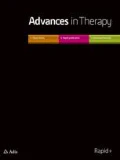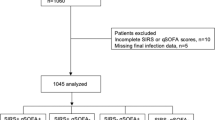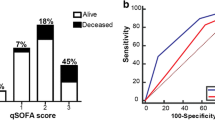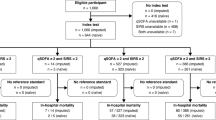Abstract
Introduction
The prognostic performance of scoring systems for illness severity in infectious kidney transplant recipients (KTRs) is rarely reported. We investigated the ability of the scores for the quick Sequential Organ Failure Assessment (qSOFA), Sequential Organ Failure Assessment (SOFA) and Systemic Inflammatory Response Syndrome (SIRS) to predict in-hospital mortality, intensive care unit (ICU) admission and mechanical ventilation (MV) requirement.
Methods
This was a second analysis of a retrospective observational study. Scores for SIRS, SOFA and qSOFA were calculated upon hospitalization (infection onset was before hospitalization) or on the day of infection onset (infection episodes were during hospitalization). The primary outcome was in-hospital mortality. The secondary outcomes were ICU admission and MV requirement. Binary logistic regression and area under the receiver operating characteristic curve (AUC) were employed to assess prognostic performance.
Results
A total of 161 infectious episodes occurred in 97 KTRs. Forty patients (41%) experienced more than one episode. The SOFA score was available in 161 infections, and scores for qSOFA and SIRS were available in 160 infections. The SIRS score was not different between KTRs with opposite outcomes. The qSOFA score was higher in infections necessitating MV. The SOFA score was significantly higher in the deceased, those needing ICU admission, MV, and for those with positive etiology results. The SOFA score was the only independent predictor of in-hospital mortality, ICU admission, and MV requirement, and the AUCs were 0.879, 0.815, and 0.784, respectively. The optimum cutoff value of predicting the three outcomes was SOFA score ≥ 3.
Conclusions
The SOFA score (but not those for SIRS and qSOFA) independently predicted in-hospital mortality, ICU admission, and MV requirement in infectious KTRs.





Similar content being viewed by others
References
Singer M, Deutschman CS, Seymour CW, Shankar-Hari M, Annane D, Bauer M, et al. The Third International Consensus Definitions for Sepsis and Septic Shock (Sepsis-3). JAMA. 2016;315(8):801–10. https://doi.org/10.1001/jama.2016.0287.
Fernando SM, Tran A, Taljaard M, Cheng W, Rochwerg B, Seely AJE, et al. Prognostic accuracy of the quick sequential organ failure assessment for mortality in patients with suspected infection: a systematic review and meta-analysis. Ann Intern Med. 2018;168(4):266–75. https://doi.org/10.7326/M17-2820.
Maitra S, Som A, Bhattacharjee S. Accuracy of quick Sequential Organ Failure Assessment (qSOFA) score and systemic inflammatory response syndrome (SIRS) criteria for predicting mortality in hospitalized patients with suspected infection: a meta-analysis of observational studies. Clin Microbiol Infect. 2018;24(11):1123–9. https://doi.org/10.1016/j.cmi.2018.03.032.
Wang XW, Niu XG, Li JX, Zhang SS, Jiao XF. SOFA Score can effectively predict the incidence of sepsis and 30-day mortality in liver transplant patients: a retrospective study. Adv Ther. 2019;36:645–51. https://doi.org/10.1007/s12325-019-0889-z.
Klouche K, Amigues L, Massanet P, Garrigue V, Delmas S, Szwarc I, et al. Outcome of renal transplant recipients admitted to an intensive care unit: a 10-year cohort study. Transplantation. 2009;87(6):889–95. https://doi.org/10.1097/TP.0b013e31819a688a.
Mouloudi E, Massa E, Georgiadou E, Iosifidis E, Katsika E, Rembelakos G, et al. Infections related to renal transplantation requiring intensive care admission: a 20-year study. Transpl Proc. 2012;44(9):2721–3. https://doi.org/10.1016/j.transproceed.2012.09.023.
Chen YX, Li R, Gu L, Xu KY, Liu YZ, Zhang RW. Risk factors and etiology of repeat infection in kidney transplant recipients. Medicine. 2019;98(38):e17312. https://doi.org/10.1097/MD.0000000000017312.
Levy MM, Fink MP, Marshall JC, Abraham E, Angus D, Cook D, et al. 2001 SCCM/ESICM/ACCP/ATS/SIS international sepsis definitions conference. Intensive Care Med. 2003;29(4):530–8. https://doi.org/10.1007/s00134-003-1662-x.
Seymour CW, Liu VX, Iwashyna TJ, Brunkhorst FM, Rea TD, Scherag A, et al. Assessment of clinical criteria for sepsis: for the third international consensus definitions for sepsis and septic shock (sepsis-3). JAMA. 2016;315(8):762–74. https://doi.org/10.1001/jama.2016.0288.
Vincent JL, Moreno R, Takala J, Willatts S, De Mendonça A, Bruining H, et al. The SOFA (Sepsis-related Organ Failure Assessment) score to describe organ dysfunction/failure. On behalf of the Working Group on Sepsis-Related Problems of the European Society of Intensive Care Medicine. Intensive Care Med. 1996;22(7):707–10. https://doi.org/10.1007/bf01709751.
Kidney Disease: Improving Global Outcomes (KDIGO) Transplant Work Group. KDIGO clinical practice guideline for the care of kidney transplant recipients. Am J Transpl. 2009;9(Suppl 3):S1–155. https://doi.org/10.1111/j.1600-6143.2009.02834.x.
Seymour CW, Rea TD, Kahn JM, Walkey AJ, Yealy DM, Angus DC. Severe sepsis in pre-hospital emergency care: analysis of incidence, care, and outcome. Am J Respir Crit Care Med. 2012;186(12):1264–71. https://doi.org/10.1164/rccm.201204-0713OC.
Lo RSL, Leung LY, Brabrand M, Yeung CY, Chan SY, Lam CCY, et al. qSOFA is a poor predictor of short-term mortality in all patients: a systematic review of 410,000 patients. J Clin Med. 2019;8(1):E61. https://doi.org/10.3390/jcm8010061.
Umemura Y, Ogura H, Gando S, Shiraishi A, Saitoh D, Fujishima S, et al. Prognostic Accuracy of Quick SOFA is different according to the severity of illness in infectious patients. J Infect Chemother. 2019. https://doi.org/10.1016/j.jiac.2019.05.010.
Hwang SY, Jo IJ, Lee SU, Lee TR, Yoon H, Cha WC, et al. Low accuracy of positive qSOFA criteria for predicting 28-day mortality in critically ill septic patients during the early period after emergency department presentation. Ann Emerg Med. 2018;71(1):1–9.e2. https://doi.org/10.1016/j.annemergmed.2017.05.022.
Saeed K, Wilson DC, Bloos F, Schuetz P, van der Does Y, Melander O, et al. The early identification of disease progression in patients with suspected infection presenting to the emergency department: a multi-centre derivation and validation study. Crit Care. 2019;23(1):40. https://doi.org/10.1186/s13054-019-2329-5.
Innocenti F, Tozzi C, Donnini C, De Villa E, Conti A, Zanobetti M, Pini R. SOFA score in septic patients: incremental prognostic value over age, comorbidities, and parameters of sepsis severity. Intern Emerg Med. 2018;13(3):405–12. https://doi.org/10.1007/s11739-017-1629-5.
Holder AL, Overton E, Lyu P, Kempker JA, Nemati S, Razmi F, et al. Serial daily organ failure assessment beyond ICU day 5 does not independently add precision to ICU risk-of-death prediction. Crit Care Med. 2017;45(12):2014–22. https://doi.org/10.1097/CCM.0000000000002708.
Khwannimit B, Bhurayanontachai R, Vattanavanit V. Comparison of the accuracy of three early warning scores with SOFA score for predicting mortality in adult sepsis and septic shock patients admitted to intensive care unit. Heart Lung. 2019;48(3):240–4. https://doi.org/10.1016/j.hrtlng.2019.02.005.
Yu S, Leung S, Heo M, Soto GJ, Shah RT, Gunda S, et al. Comparison of risk prediction scoring systems for ward patients: a retrospective nested case–control study. Crit Care. 2014;18(3):R132.
de Grooth HJ, Geenen IL, Girbes AR, Vincent JL, Parienti JJ, Oudemans-van Straaten HM. SOFA and mortality endpoints in randomized controlled trials: a systematic review and meta-regression analysis. Crit Care. 2017;21(1):38. https://doi.org/10.1186/s13054-017-1609-1.
Acknowledgements
We are grateful to Professor Xiao-Dong Zhang and Xiao-Peng Hu (Department of Urology Surgery, Beijing Chao-Yang Hospital, Capital Medical University, Beijing, China) for supervising immunosuppressive therapy in the enrolled patients. We thank Professor Li-Rong Liang (Department of Respiratory and Critical Care Medicine, Beijing Key Laboratory of Respiratory and Pulmonary Circulation, Beijing Institute of Respiratory Medicine, Beijing Chao-Yang Hospital, Capital Medical University, Beijing, China) for helping us in statistical analysis.
Funding
No funding or sponsorship was received for this study or publication of this article. The Rapid Service Fee was funded by the authors.
Editorial Assistance
We thank Arshad Makhdum, PhD, from Liwen Bianji, Edanz Group China (http://www.liwenbianji.cn/ac), for editing the English text of a draft of this manuscript.
Authorship
All named authors meet the International Committee of Medical Journal Editors criteria for authorship for this article, take responsibility for the integrity of the work as a whole, and have given their approval for this version to be published.
Authors’ contributions
Yun-Xia Chen and Li Gu conceived and designed the study. Yun-Xia Chen was the primary author, editor of the manuscript, and the lead clinical investigator. All authors contributed to the review of EMRs and data collection. Yun-Xia Chen analyzed the data. Li Gu takes responsibility for the manuscript as a whole. All authors critically reviewed and approved the final version of the manuscript. Yun-Xia Chen and Ran Li contributed to the work equally and should be regarded as co-first authors.
Disclosures
Yun-Xia Chen, Ran Li, Li Gu, Kai-Yi Xu, Yong-Zhe Liu and Ren-Wen Zhang report no conflicts of interest.
Compliance with Ethics Guidelines
The study was approved by the ethics board of Beijing Chao-Yang Hospital, with a waiver for informed consent.
Data Availability
The datasets used and/or analyzed during the present study are available from the corresponding author upon reasonable request.
Author information
Authors and Affiliations
Corresponding author
Additional information
Enhanced Digital Features
To view enhanced digital features for this article go to https://doi.org/10.6084/m9.figshare.11499423.
Rights and permissions
About this article
Cite this article
Chen, YX., Li, R., Gu, L. et al. Prognostic Performance of SOFA, qSOFA, and SIRS in Kidney Transplant Recipients Suffering from Infection: A Retrospective Observational Study. Adv Ther 37, 1100–1113 (2020). https://doi.org/10.1007/s12325-020-01225-0
Received:
Published:
Issue Date:
DOI: https://doi.org/10.1007/s12325-020-01225-0




